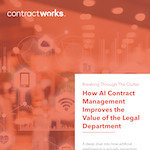Reprinted from Saxe Doernberger & Vita, P.C.
On April 4, 2019, the Appellate Division of the New Jersey Superior Court confirmed that the waiver of subrogation provision in a commonly used form construction contract, American Institute of Architects (AIA) form A201 — 2007 General Conditions of the Contract for Construction, precluded an insurer’s claims against a subcontractor.
In Ace American Ins. Co. v. American Medical Plumbing, Inc., the court considered Ace American Insurance Company’s (Ace) subrogation claim against a plumbing subcontractor who was allegedly responsible for a water main leak that caused approximately $1.2 million in damages to Ace’s insured, Equinox Development Corporation (Equinox).
In March 2012, Equinox entered into a contract with Grace Construction Management Company, LLC (Grace) to build the “core and shell” of a new health club. Equinox and Grace used AIA form A201 for their contract. Grace then hired American Medical Plumbing, Inc. (American) as a plumbing subcontractor for the project. In April 2013, the water main failed, flooding the health club.
Ace, Equinox’s first-party property insurer, paid Equinox for the damages and sued American to recover these damages. American sought summary judgment, arguing that the waiver of subrogation provision in the contract between Grace and Equinox precluded Ace’s claim.
The relevant contract provision states that:
“The Owner and Contractor waive all rights against … each other and any of their subcontractors, sub-subcontractors, agents and employees, each of the other … for damages caused by fire or other causes of loss to the extent covered by property insurance obtained pursuant to this Section 11.3 or other property insurance applicable to the Work, except such rights as they have to proceeds of such insurance held by the Owner as fiduciary.”
The trial court granted summary judgment in favor of American, finding that the waiver of subrogation in the contract applied to Ace’s claim. Ace appealed.
On appeal, Ace argued that the waiver only applied to claims for damage to the construction work itself and did not apply after the competition of construction. In this case, the damage was to not to the construction work itself – i.e., the “core and shell” of the health club. Instead, the majority of the damage was to the health club’s internal construction and furnishings.Additionally, the water main failed after the completion of construction.
The appellate court affirmed the trial court’s ruling, finding that “Ace misconstrue[d] the basic structure of the contract’s waiver provision.” The court found that the waiver applied to all damages covered by the property insurance regardless of whether the damage occurred after the completion of construction or included damage to work besides the contractor’s work.
The court also rejected Ace’s argument that this broad application of the waiver was inconsistent with AIA form A201’s requirement that the contractor carry liability insurance. The court found that “the subrogation waiver takes precedence over the contractor’s insurance obligation.” The court found that the contractor’s liability insurance served other important functions such as providing an extra layer of coverage beyond the owner’s property insurance and providing protection against injured third parties.
The New Jersey appellate court’s ruling follows the majority position on the scope of the waiver of subrogation in the standard AIA contract. However, a minority of jurisdictions do not recognize a waiver.
________________________________________________________________
1. No. A-5395-16T4 (N.J. App. Div. April 4, 2019)





